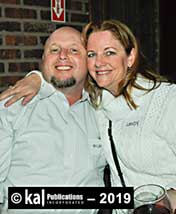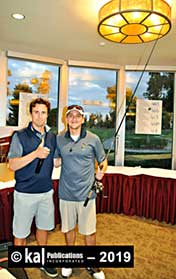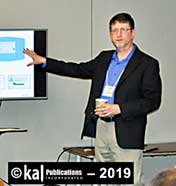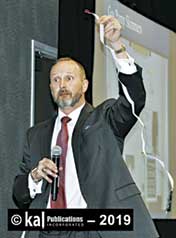
Petroleum Marketing Equipment Customer Appreciation

Central Valley Petroleum Industry Golf Invitational


CFN/Pacific Pride National Meeting
Want to see the photos that didn't make the issue? Check out the Cutting Room Floor.
Offen to Acquire Allied Energy
KB Oil Acquired by Parkland Fuel
Yakama Tribe Exempt from Paying Fuel
Taxes
San Francisco Bans Credit-Only Retail
Bill Promoting Electric Trucks Signed in
Nevada
DENVER, CO. — Offen Petroleum, based here, has announced plans to acquire Allied Energy of Phoenix, AZ. The purchase price for the deal was not disclosed.
Allied Energy distributed fuel to customers in Arizona, Nevada, New Mexico, Texas, and California under the leadership of Gabe McLure, a third generation petroleum marketer. Following the conclusion of the sale, Allied Energy will market under the Offen Petroleum brand and image.
Offen officials said that "Allied's strength in Arizona and Nevada provide Offen with opportunities in the Phoenix, Tucson, and Las Vegas markets and will further enhance Offen's ability to sell and deliver motor fuels for our valued customers."
Offen Petroleum is a portfolio company of the private equity company Lariat Partners. Operating under the leadership of CEO Bill Gallagher, Offen has been rapidly expanding from the Rocky Mountains. Most recently, Offen acquired Overland Petroleum in August 2018, growing the company's footprint to 12 neighboring states.
Offen officials added, "Offen will continue to pursue acquisition opportunities that would allow us to serve a broader customer base and provide density in our core areas while exploring adjacent geographies."
The sale of Allied Energy is expected to close in May 2019.
CEDAR CITY, UT. — Parkland Fuel Corporation has signed a deal to acquire Ken Bettridge Distributing Inc., operating as KB Oil, in a deal announced in May. The purchase price was not disclosed.
Included in the sale are KB Oil's nine convenience stores, operating under the name KB Express, as well as the company's fuel and distribution business, cardlocks, fleet fueling business, real estate, and trucking fleet operating in Utah and Nevada.
The KB Oil assets will be merged into Parkland's Rockies Regional Operating Center, headquartered in American Fork, UT., and will operate under the Rhinehart Oil brand.
Parkland Fuel acquired Rhinehart Oil and its operations in Utah, Colorado, Wyoming, and New Mexico last August.
It is expected the majority of the company's 160 employees will be offered positions with Parkland.
"We've been a family-owned business for more than 40 years, and the professional business model and culture of Parkland appealed to us as we looked to sell," said Stacey Bettridge, Co-President of KB Oil, announcing the deal.
Brothers Stacey Bettridge and Rand Bettridge have run the Cedar City-based family business since 2006. The company was founded their parents, Ken and Georgia Bettridge, in 1976.
"KB Oil has long been a respected and admired provider of bulk fuels and lubricants in the region and is an expert in the trucking industry," said John Jardine, vice president of Parkland USA and General Manager of the Rockies ROC. "The acquisition of KB Oil follows on our US growth strategy by establishing scale through the addition of strong local operators." He added, "Parkland will be able to leverage its resources to better serve customers throughout Utah and Nevada."
The sale is expected to close by the end of the second quarter of 2019.
WASHINGTON, D.C. — The United States Supreme Court has ruled that state fuel taxes do not have to be paid by a Native American fuel distributor in a decision that was handed down at the end of March.
The case originally was filed in 2013 when the Washington Department of Licensing sued the Cougar Den gasoline station, located in White Swan on the Yakama Reservation, for non-payment of gasoline taxes. The state charged that the station owed more than $3 million in unpaid taxes from fuel that was brought in from Oregon and sold at the station. That amount has been rising steadily as the case wound its way through the court system.
In a split decision, the Supreme Court ruled that the Yakama Treaty of 1855, signed between the tribe and the United States, pre-empted the tax.
One of the terms of the Yakama Treaty was a "right to travel" clause and the justices interpreted that clause as to mean Cougar Den was free to move its fuel in and out of the reservation.
Writing in favor of Cougar Den, Justices Elena Kagan, Sonia Sotomayor and Stephen Breyer interpreted the treaty's guarantee of free travel on public highways as meaning the tribe didn't have to pay the gasoline tax. Justices Ruth Bader Ginsburg and Neil Gorsuch, who also sided with Cougar Den, believed the treaty provided the Yakama Tribe with the right to move goods "freely."
In his dissent, Supreme Court Chief Justice John Roberts noted that he believed the tax was "for possessing fuel, not for traveling on the highways," and therefore did not violate the 1855 treaty.
It is believed that this decision may allow tribes across the nation to refuse to pay state and local taxes on gasoline — as well as other highly taxed products such as tobacco and alcohol.
SAN FRANCISCO— Brick-and-mortar retailers in the city of San Francisco must be able to take cash as payment for goods "and some services."
The San Francisco Board of Supervisors voted unanimously in May to enact the regulation, putting an end to a trend of accepting only credit cards for purchases. Several businesses in San Francisco, "primarily located in San Francisco's Financial District and South of Market neighborhoods, catering mainly to white collar employees," did not accept cash, including coffee chain Bluestone Lane, Freshroll Vietnamese Rolls & Bowls, and fast food chicken restaurant The Organic Coup. National restaurant chain Sweetgreen does not accept cash in any of its locations. And, notably, Amazon Go convenience stores do not accept cash.
Retailers in favor of limiting their sales to credit or debit cards claimed that it reduces the opportunity for theft, increases safety, and streamlines the checkout process.
Supervisor Vallie Brown argued that eliminating the option for cash would unfairly limit the ability of customers without a credit card — including youths, victims of ID theft, immigrants, and homeless people — to make purchases.
Brown stated that the new regulation "will go far in ensuring all San Franciscans have equitable access to the city's economy."
Food trucks, temporary pop-up stores, and internet-only businesses such as ride-hailing companies would not be required to accept cash under the new law.
Similar bans have been enacted in Philadelphia and New Jersey. San Francisco is the first Western city to ban cashless retailing.
CARSON CITY, NV. — A new Nevada bill, designed to encourage the use of electric heavy-duty trucks, has been signed into law by state Governor Steve Sisolak.
Assembly Bill 377, sponsored by Assemblyman Howard Watts III, would bring Nevada law into line with new federal guidelines by allowing electric-powered semi trucks, among others, to be exempted from certain weight limits on state roads.
Proponents say this will allow new technologies to compete with traditional diesel-powered engines. The weight of the batteries required to move heavy-duty vehicles in many cases would cause the trucks to be overweight for the state's highways if they carried a traditional-sized load of cargo.
The bill passed 39 to 1 in the Assembly and 20 to 1 in the Nevada Senate and was signed by the Governor mid-May.
Originally published in the June 2019 issue of O&A
Marketing
News.
Copyright 2019 by KAL Publications Inc.
Serving the 13 Western States, the World's Largest Gasoline, Oil, Fuel, TBA and Automotive Service Market